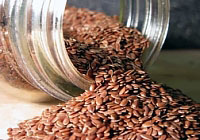Flax seed: methods of application, indications and contraindications to use, the beneficial properties of linseed seed.
Content
- Flax seed as a biologically active additive for food
- Methods for applying flax seed
- Contraindications for the use of flax seed
 The main application that finds the flax seed in modern medicine, — This is the treatment of diseases of the digestive. During the contact of seeds with water, a mucus is formed, which is held on the walls of the stomach and intestines for a long time, protecting the mucous membranes from irritation with digestive juices. Substances that are part of the flax seed have an enveloping, anti-inflammatory and light laxative effect. Fat oils promote tissue regeneration. Thus, flax seed is an indispensable tool in the treatment of gastritis and ulcerative disease of the stomach and duodenal. The fiber contained in the flaxseed seed is a good sorbent and enhances the intestinal motility, which is important when constipation, colitis and enteritis.
The main application that finds the flax seed in modern medicine, — This is the treatment of diseases of the digestive. During the contact of seeds with water, a mucus is formed, which is held on the walls of the stomach and intestines for a long time, protecting the mucous membranes from irritation with digestive juices. Substances that are part of the flax seed have an enveloping, anti-inflammatory and light laxative effect. Fat oils promote tissue regeneration. Thus, flax seed is an indispensable tool in the treatment of gastritis and ulcerative disease of the stomach and duodenal. The fiber contained in the flaxseed seed is a good sorbent and enhances the intestinal motility, which is important when constipation, colitis and enteritis.
Flax seed as a biologically active additive for food
The use of flax seed is not limited to the region of gastroenterology. It is known that this product contains useful substances indispensable to the body:
- Polyunsaturated fatty acids (omega-3, −6, −nine);
- antioxidants;
- Vitamins A, E, B;
- trace elements (selenium, potassium).
Polyunsaturated fatty acids contained in linen seed are necessary for the construction and regeneration of cell membranes and obtaining the necessary compounds for the body, contribute to improving the condition of the skin, reduce blood cholesterol levels. Flax seeds are used for the prevention and treatment of atherosclerosis and its consequences: stroke, heart attack, thrombosis. The use of flax seeds in food allows to reduce insulin doses in patients with diabetes mellitus, has a desensitizing effect under allergic diseases. Decoction of flax seed has an antiparasitic effect. It is used in inflammatory diseases of the oral cavity, throat, with dry cough.
Methods for applying flax seed
 When using flax seed as a food additive, it can be eaten in dry form together with fermented milk products, porridge, bakery products. Daily rate — about 5 g of seed.
When using flax seed as a food additive, it can be eaten in dry form together with fermented milk products, porridge, bakery products. Daily rate — about 5 g of seed.
For the treatment of diseases of the stomach and intestines, the decoction of flax seeds. For its preparation 1 teaspoon (3 g) of seeds, it is necessary to pour 100 ml of boiling water and shabby for 15 minutes, then strain. It is recommended to drink a quarter cup three times a day for half an hour before meals. Only freshly prepared decoction take inside.
Contraindications for the use of flax seed
In addition to cases of individual intolerance, the seed of flax is not recommended for use in acute cholecystitis and chronic cholecystitis in the stages of exacerbation, with intestinal obstruction, esophageal strictures, children under 12 years. The use of seeds inside without sufficient fluid intake can lead to intestinal obstruction.









